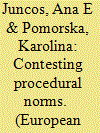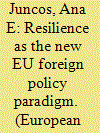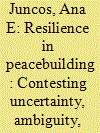|
|
|
Sort Order |
|
|
|
Items / Page
|
|
|
|
|
|
|
| Srl | Item |
| 1 |
ID:
180559


|
|
|
|
|
| Summary/Abstract |
While there is increasing evidence in the literature of politicisation in the area of European foreign policy, we know less about how this has affected the dynamics of cooperation among EU member states and, specifically, the procedural norms that govern this policy. This article is concerned with how politicisation and contestation manifest at the micro-level and how they might shape everyday EU foreign policy negotiations. It seeks to establish to what extent politicisation – resulting from the emergence of a new political cleavage centred around issues of identity and supranational integration – has driven normative contestation within EU foreign policy negotiations and whether this has led to the erosion of long-standing procedural norms in European foreign policy. Our findings suggest that despite CFSP Council committees being an institutional arena, characterised by intergovernmental, relatively insulated, and technical decision-making, current processes of politicisation linked to the rise of populism and the increasing transfer of authority to the EEAS have increased contestation of norms within this setting. However, procedural norms have remained relatively resilient to these challenges.
|
|
|
|
|
|
|
|
|
|
|
|
|
|
|
|
| 2 |
ID:
171161


|
|
|
|
|
| Summary/Abstract |
The article provides a critical overview of the rise of resilience at the European Union (EU) level and to what extent its adoption is reshaping the terms of the EU’s peacebuilding interventions. It argues that resilience offers a four-fold contribution to promoting sustainable peace: (1) a focus on complexity; (2) a systems approach; (3) a shift toward local capacities; and (4) an emphasis on human agency. The article then applies this framework to assess the implementation of the EU’s “resilience turn” since the adoption of the EU Global Strategy in 2016. Focusing on the EU’s discourse and its peacebuilding practices in the Western Balkans, the evidence suggests that the EU has only embraced a systems/integrated approach, while neglecting deeper understandings of complexity, local capacities and human agency. As a result, the contribution of resilience to EU peacebuilding remains limited.
|
|
|
|
|
|
|
|
|
|
|
|
|
|
|
|
| 3 |
ID:
151387


|
|
|
|
|
| Summary/Abstract |
This article examines the rise of resilience discourses in EU foreign policy. The European Union Global Strategy (EUGS) refers to building state and societal resilience in its neighbourhood as one of the key strategic priorities of the EU. This article argues that the discourse of resilience that permeates the EUGS chimes well with a pragmatist turn in social sciences and global governance. The EUGS introduces resilience-building alongside an emphasis on flexibility, tailor-made approaches and the need for local ownership, capacity-building and comprehensiveness. More importantly, the new EUGS proposes “principled pragmatism” as a new operating principle in its foreign policy. While this might suggest a more pragmatic EU foreign policy, a closer examination of the EUGS discourse reveals significant tensions between a pragmatic and a principled foreign policy, which undermine the added value of resilience-building as a new foreign policy paradigm.
|
|
|
|
|
|
|
|
|
|
|
|
|
|
|
|
| 4 |
ID:
160736


|
|
|
|
|
| Summary/Abstract |
With the failure of liberal peace strategies in the Global South, resilience has recently become the risk management strategy par excellence in peacebuilding. Since it is not possible to predict when the next crisis will take place, peacebuilders must invest in bottom-up adaptive capacities to cope with external shocks. This article moves away from governmentality accounts of resilience which are overtly deterministic and depoliticizing. Instead, it posits that the uncertainty, ambiguity, and complexity associated with resilience mean that we should expect opportunities for contestation and institutional agency. This argument will be illustrated by drawing upon the European Union’s adoption of the resilience approach in its peacebuilding and security policies. The article argues that while uncertainty, ambiguity, and complexity constitute the ontological conditions that underpin the rise of resilience in peacebuilding, they are also likely to lead to its potential demise.
|
|
|
|
|
|
|
|
|
|
|
|
|
|
|
|
|
|
|
|
|